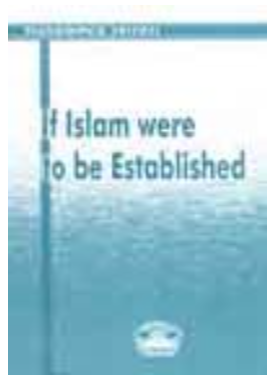
Grand Ayatollah Mohammad Shirazi's reply To the question of a group of Muslims about his views and vision about the future picture of Iraq.
In the name of Allah, the Compassionate, the Merciful.
Peace and Blessings of Allah be upon the Muslim brothers. You have asked about (the situation in) Iraq and the state it must assume in the future after the fall of the current regime by the will of Allah. We shall point to some of the 'aspects' concerned on the basis of Islamic principles, which are in harmony with the human "nature" that is "the original nature according to which Allah fashioned
mankind." {The holy Qur'an, Chapter The Romans, Chapter # 30, Verse # 30.}
1. The majority (of the population) must form the ruling government while at the same time the right of minority must be secured. The majority had the greatest role in securing Iraq's freedom on several
occasions during this century (20th century). One occasion was the 1920 revolution and the second during the second world war when the religious leaders decreed that the expulsion of the colonial powers from the country was obligatory on everyone. On those occasions the Iraqi nation did not rest until they forced the colonial powers out of the country. On the third occasion it was the majority's resistance to the rise of the communism in Iraq . . . and history has recorded those moves in detail.
Furthermore Allah the Almighty has stated in the noble Qur'an:
" . . . who (conduct) their affairs by mutual Consultation . . ."
{The holy Qur'an, Chapter Consultation, Chapter # 42, Verse # 38.}
And
" . . . and consult them in affairs (of moment) . . ."
{The holy Qur'an, Chapter The Family of 'Emraan, Chapter # 3, Verse # 159.}
In the holy tradition, it has been reported:
“ . . . so that the right of any Muslim individual is not lost."
Content
Translator's Foreword V
Preface 1
Preventing Bloodshed 5
General Amnesty 7
Good Reputation 9
Action before Slogan 11
Constitution 13
Gradual Implementation 15
Dynamic Laws 17
The Penal System 20
Possession of Real Power 23
Distribution of Power 25
Freedoms 27
Security 29
Valuing Professionals 31
Minorities and Political Parties 33
International Relations 35
Good Neighbourliness 37
Economic Development 39
Self-Sufficiency 42
Combating Unemployment 45
Civil Service Reform 47
Simplicity and Provision of Fundamental Necessities 49
Modesty of Leaders 51
Combating Corruption 53
Social Reform 55
Justice and Equality 57
Appendix 59